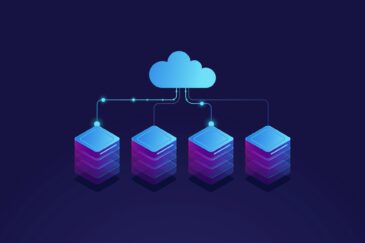What are the Core Components of IT Managed Services?

- April 23, 2024
- Mohammed Nadeem Uddin
- 0
Published On April 23, 2024
IT managed services refer to outsourcing IT functions to a third-party service provider who assumes responsibility for managing and maintaining your organization’s IT infrastructure and systems. These services can involve many IT functions, including application managed services, infrastructure management, cybersecurity, cloud services, help desk support, data backup and recovery, and more. Organizations opt for IT-managed services for several reasons:
Cost Efficiency
Managed services allow organizations to access a team of IT experts and advanced technologies without investing in hiring and training internal staff or purchasing expensive infrastructure and software. This can result in significant cost savings and predictable monthly expenses.
Expertise and Specialization
Managed service providers (MSPs) have specialized expertise across various IT domains. By partnering with an MSP, organizations gain access to a skilled team that can provide proactive monitoring, rapid problem resolution, and strategic IT guidance. The process usually involves an initial assessment of the organization’s IT needs, followed by a transition plan that outlines how to manage the transfer of IT functions. This helps ensure a smooth transition and minimizes disruptions to the organization’s operations.
Focus on Core Business
Organizations can liberate themselves from the burden of IT management tasks by outsourcing IT functions to an MSP. This allows them to redirect their resources and attention toward their core business activities, fostering a sense of focus and productivity.
Scalability and Flexibility
Managed services are often scalable and flexible, allowing organizations to easily adjust their IT resources and services according to changing business needs and fluctuations in demand. This scalability ensures organizations can adapt to growth or contraction without significant disruptions.
Enhanced Security and Compliance
Managed service providers offer robust cybersecurity solutions and compliance expertise, providing a shield of protection for organizations’ data, systems, and sensitive information. This assurance of security and compliance can help mitigate risks and ensure regulatory adherence, instilling a sense of confidence.
24/7 Monitoring and Support
Managed service providers offer around-the-clock monitoring and support, ensuring that IT systems are continuously monitored for potential issues and that problems are promptly addressed to minimize downtime and disruptions.
Access to Advanced Technologies
By partnering with MSPs, organizations gain access to cutting-edge technologies and tools that may be unattainable. Advanced technologies can drive innovation, enhance efficiency, and boost growth.
Core Components of IT Managed Services
Managed Services refer to services designed to support and optimize various aspects of an organization’s IT infrastructure. Several core components are essential, including:
Application Management
This component covers the management and support of all types of applications, including custom-built applications, third-party software, and enterprise applications like Oracle. It involves monitoring, maintenance, support, enhancement, and lifecycle management.
Infrastructure Management
This component includes managing physical and virtual servers, storage systems, and data centers. It involves provisioning, configuration, monitoring, maintenance, and troubleshooting to ensure the availability and performance of IT infrastructure.
Security Management
It protects the organization’s IT assets from cyber threats, vulnerabilities, and breaches. It includes implementing security policies, monitoring suspicious activities, running security assessments, and responding to security incidents.
Cloud Management
With increasing cloud adoption, MSPs often offer cloud management services. This component includes managing cloud infrastructure, platform services, and SaaS applications, ensuring security, compliance, and cost optimization in cloud environments.
Backup and Disaster Recovery
This component involves backing up critical data and systems and developing comprehensive disaster recovery plans to minimize downtime and data loss during hardware failures, natural disasters, or cyber-attacks.
Helpdesk and End-user Support
This component provides users with technical assistance and troubleshooting for IT issues, such as software problems, connectivity issues, and hardware malfunctions. It includes remote support, ticketing systems, and service desk operations.
Performance Monitoring and Reporting
This component involves monitoring the performance of IT systems, applications, and services to identify bottlenecks, optimize resource utilization, and ensure service level agreements are met. Reporting provides insights into system performance, trends, and areas for improvement.
Oracle Managed Services
Oracle-managed services involve the comprehensive management of Oracle software applications and systems. This includes Oracle database management, application management, patching and updates, performance monitoring, and support services tailored to the specific needs of Oracle environments.
How to Select the Right IT-Managed Service Provider
Choosing the appropriate IT-managed service provider is essential to the effectiveness of your company’s IT operations. Here are some steps to help you select the right MSP:
Define Your Requirements
Determine which services like network administration, cyber security, cloud computing, or application support you need.
Assess Expertise and Experience
Look for MSPs with expertise and experience relevant to your industry and technology requirements. To gauge their competence and reliability, check their track record, client testimonials, case studies, and certifications.
Evaluate Service Offerings
Assess the MSP’s range of services, ensuring they align with your organization’s needs. Consider whether they offer proactive monitoring, helpdesk support, disaster recovery, cybersecurity services, cloud management services, cloud management solutions, and other essential services.
Scalability and Flexibility
Choose an MSP capable of scaling their services as your organization grows or your needs change. Ensure they offer flexible service plans and can accommodate your evolving requirements without disruption.
Security Measures
Examine the MSP’s compliance certifications, security procedures, and policies. To safeguard your data and systems, ensure they have strong security mechanisms in place and adhere to industry best practices.
Response Times and SLAs
Evaluate the MSP’s response times and service level agreements (SLAs) to resolve issues and provide support. Ensure their SLAs align with your organization’s needs and expectations, mainly if you operate in a mission-critical environment.
Customer Support and Communication
Assess the MSP’s customer support capabilities and communication channels. Ensure they provide responsive and reliable support, with clear lines of communication and escalation procedures in place.
Cost and Value
Consider the cost of the MSP’s services and the value they provide. Look for transparent pricing models and ensure there are no hidden costs. Assess the ROI of their services based on the efficiency, reliability, and security improvements they offer.
Cultural Fit
Choose an MSP that aligns with your organization’s culture, values, and communication style. Look for a partner rather than just a vendor, someone who understands your business goals and is committed to your long-term success.
References
Seek references from trusted sources, such as peers, industry associations, or online reviews. Speak to existing MSP clients to gain insights into their experiences and satisfaction levels.

Services
Products
Company
Copyright © 2025 Rite Software Solutions & Services LLC. All rights reserved.



